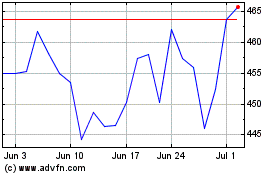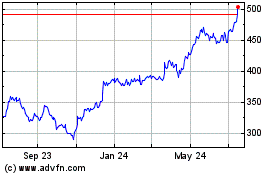By Liz Hoffman
David Solomon became the heir apparent at Goldman Sachs Group
Inc. Monday after his main rival for the top job abruptly resigned,
moves that show the Wall Street powerhouse is continuing to move
beyond its trading roots.
The surprise announcement came after Goldman's board of
directors last month anointed Mr. Solomon as the eventual successor
to current CEO Lloyd Blankfein, according to people familiar with
the matter.
The Wall Street Journal reported last week that Mr. Blankfein
could retire as soon as year-end, though he remains firmly in
control of his exit. Messrs. Schwartz, 54, and Solomon, 56, who
were jointly elevated to the No. 2 role in December 2016, were the
top contenders to succeed him.
The two hail from different parts of the firm. Mr. Solomon is a
longtime investment banker who DJs on the side. Mr. Schwartz, a
karate black belt, scaled the ranks of Goldman's trading arm on his
way to becoming CFO.
In choosing Mr. Solomon, Goldman is going with a business
builder who is respected, if not universally loved, inside the
firm. The move amounts to a bet that the coming decade will look
little like the last one, as Goldman continues to evolve from a
secretive trading powerhouse into a more entrepreneurial place.
The two men were told of the board's decision last week, at
which point Mr. Schwartz, who was informed upon his return from a
West Coast trip, said he would leave, people familiar with the
matter said.
Mr. Blankfein shared the news Monday morning with the firm's
management committee, a group of about 35 top officials. "Harvey's
leaving the firm, " the typically blunt CEO said, according to
people briefed on the meeting. Mr. Solomon quickly canceled a
planned trip to China.
For generations, power at Goldman has tended to swing from
bankers to traders. When Mr. Blankfein, a former trading chief,
took over in 2006, that business was dominant. Since the financial
crisis, though, it has faltered, sending Goldman into new
businesses like consumer banking and low-fee index funds in search
of growth.
Those changes were seen to favor Mr. Solomon. He know known less
as a superstar deal maker than a strong manager, able to prune dead
weight, motivate strivers and marshal Goldman's resources behind
big initiatives.
"David is a pied piper, and I mean that in the best way," said
Chris Nassetta, CEO of Hilton Hotels Corp., who worked with Mr.
Solomon at Bear Stearns. "People want to follow him."
Mr. Solomon came to Wall Street in the mid-1980s, selling
commercial paper at Drexel Burnham Lambert. Off duty, he played
social planner to a group of college friends, organizing casino
outings in Atlantic City and summer rentals in the Hamptons, where
roommates would wake up to find him mowing the lawn.
After a stint at Bear Stearns, Mr. Solomon joined Goldman as a
rare outside partner in 1999 and set about to build a junk-debt
business. In 2006 he assumed responsibility for Goldman's
investment bankers, who advise companies on mergers and
fundraisings.
Mr. Solomon is credited with professionalizing that division,
which he ran for a decade. The unit's profit margin doubled, even
as some longtime bankers lamented the decline of collegiality and
autonomy.
He had a policy of giving zero bonuses to the bottom 5% of
employees, executives said. But he also spearheaded Goldman's
efforts to lighten the workload for junior bankers, and took a
leading role in the firm's effort to recruit and promote women. He
built a debt capital-markets business that reported record revenues
last year.
Mr. Schwartz, meanwhile, embodied Goldman's profitable past,
having scaled the ranks of its trading division. As finance chief
from 2013 to 2016, Mr. Schwartz navigated the political and market
forces that reshaped banking after the crisis, and was a strong
hand in the areas of risk management and regulation.
He graduated from high school in New Jersey with grades so poor
he didn't bother applying to college. He eventually attended
Rutgers University, working as nightclub bouncer and other odd jobs
to pay his way, and joined Citigroup Inc. as an operations temp in
1989.
He came to Goldman's commodities trading arm in 1997 as a
derivatives salesman, helping energy and mining companies protect
themselves from price swings.
By 2008, Mr. Schwartz was running the trading division. As the
financial crisis unfolded, he kept the firm on the offensive while
competitors pulled back. The gambit worked: Goldman's traders made
$33 billion in 2009, the most profitable year on record for a Wall
Street broker-dealer.
Mr. Schwartz was named CFO four years later, a move was so
unexpected that senior executives including the firm's heads of
risk and accounting threatened to quit, according to a person
familiar with the matter.
But Mr. Schwartz won over critics by overseeing an operation
that avoided surprises that plagued other banks. His 18-quarter
tenure as CFO is captured in pen on a pair of lime-green boxing
gloves that he keeps in his office: "18-0, all by KO."
Write to Liz Hoffman at liz.hoffman@wsj.com
(END) Dow Jones Newswires
March 12, 2018 17:33 ET (21:33 GMT)
Copyright (c) 2018 Dow Jones & Company, Inc.
Goldman Sachs (NYSE:GS)
Historical Stock Chart
From Mar 2024 to Apr 2024

Goldman Sachs (NYSE:GS)
Historical Stock Chart
From Apr 2023 to Apr 2024
